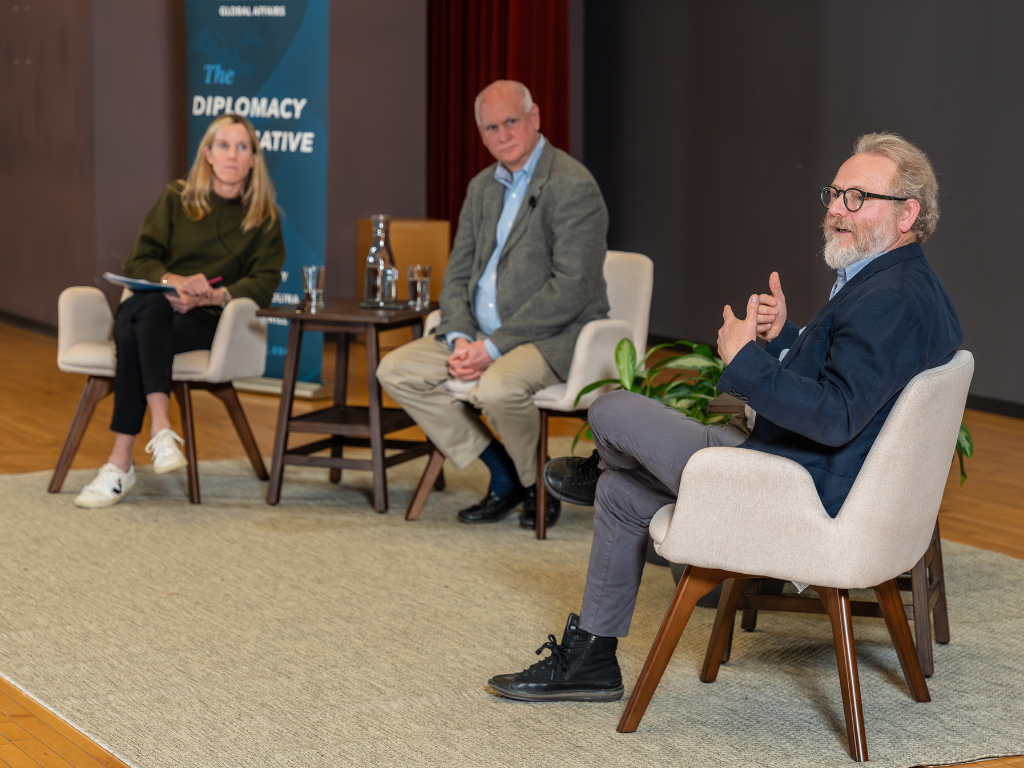Co-hosts from the “Brussels Sprouts” podcast discussed the upcoming Russian presidential election in a live event at UNC-Chapel Hill. They interviewed UNC political science professor Graeme Robertson and King’s College London professor Samuel Greene.

On Wednesday, Jan. 31, before the start of the latest Diplomatic Discussion, Vice Provost for Global Affairs and Chief Global Officer Barbara Stephenson welcomed Carolina students and faculty and said, “We’re doing something different tonight, and I’m excited about it.”
The Office of the Vice Provost for Global Affairs has organized several Diplomatic Discussions on the conflict between Russia and Ukraine, including the recent visit from Estonia’s ambassador to the U.S. Kristjan Prikk. And the latest event furthered this conversation in a format entirely new to the Diplomacy Initiative: a live podcast recording for a studio audience.
The popular, Washington, D.C.-based podcast, called “Brussels Sprouts,” focuses on transatlantic security. The episode recorded live at UNC centered on the topic: Russia’s Election and Putin’s Power.
Andrea Kendall-Taylor and Jim Townsend — both former U.S. national security officials now with the Center for a New American Security (CNAS) — co-host the podcast. Their episodes feature guests with backgrounds in security and defense. On a few occasions, they have recorded episodes in the field or while traveling, and this episode — which is available now here — was recorded in front of an audience of UNC students in Mandela Auditorium and includes questions asked by Carolina students.
The co-hosts interviewed Graeme Robertson and Samuel Greene. Robertson is professor of political science at UNC and the director of UNC’s Center for Slavic, Eurasian and East European Studies. Greene is professor in Russian politics at King’s College London and the director of democratic resilience at the Center for European Policy Analysis. Together, they wrote Putin v. the People: The Perilous Politics of a Divided Russia and are experts in Russian public opinion, among other aspects of Russian society.
According to Greene, Russians are aware their government does not have their best interests in mind. “[The Russian] people have dealt with a tremendous amount of economic hardship over the years in Russia,” he said. “They’ve learned to live without a state that serves them. They’ve learned to cope with a predatory state. They understand that it’s corrupt. It’s not difficult to convince people in Russia that they are badly governed.”
As a result, “as long as Putin can limit what this war demands of the Russian people,” Greene said, Putin — and his war in Ukraine — remain popular.
Greene and Robertson look to different theories and constructs to understand these behaviors. One is system justification theory, which describes, according to Robertson, “people being willing to put up with a lot of stuff in the name of their country.”
Fervent patriotism enables many Russians to accept the hardships of Putin’s war in Ukraine. And for Putin, it is particularly important that they support him as Russia prepares to hold a presidential election in March. He is expected to win a fifth term, despite having no policy platform, Greene said. “Putin is avoiding any discussion of the future,” he said. “If you look at Putin’s campaign website, there is no platform on it. There are no policies or projects proposed. There is nothing that talks about the future.”
And that is why, Robertson said, “The role of this election is to solidify Putin’s role for the [future] and kill the conversation about succession.”
As for the war, there appears to be no real insight into Putin’s strategy. “When this war started, we were thinking this was an extraordinary act of self-harm,” Robertson said. “[But now we see, Russia has] embarked upon what has turned out to be potentially a forever war.”
CNAS started the “Brussels Sprouts” podcast in 2018 and has an archive of more than 270 episodes. The number of subscribers, downloads and streams has grown sixfold since Russia invaded Ukraine in February 2022, as Kendall-Taylor, Townsend and their guests have become a steady, reliable source of trusted updates for practitioners, students and anyone interested in national security.
Stream the full episode — recorded live at UNC — here.
By Joshua K. Jennings, UNC Global Affairs
